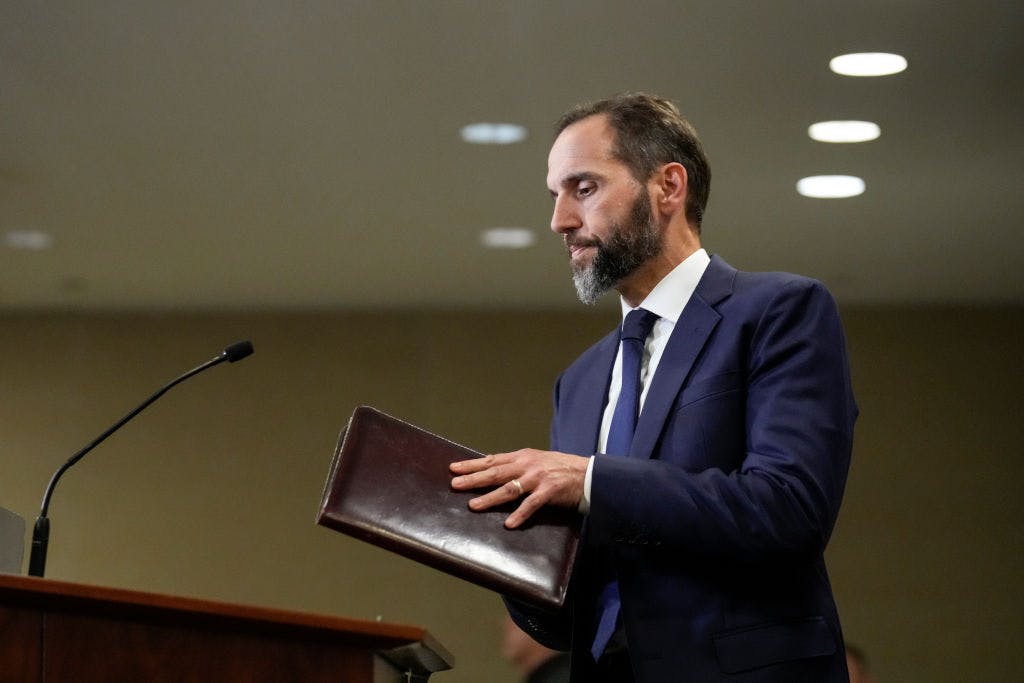Jack Smith, in Startling Filing in Trump Mar-a-Lago Case, Admits To Misleading Judge and Altering Order of Secret Documents
The special counsel, in a possible boon to Trump, admits to misleading the courts to whether the Mar-a-Lago documents were kept in their original order.

Special Counsel Jack Smith’s admission that the evidence in the Mar-a-Lago documents case could have been jumbled out of its initial sequence — and that he misled the court on this score — could provide fresh grounds for President Trump to challenge the prosecution.
The disclosure came in a Friday evening filing to Judge Aileen Cannon. The occasion was the special counsel’s response to one of Mr. Trump’s codefendants, the valet Waltine Nauta. Mr. Nauta wants more time to prepare his defense, and asserts that the discovery provided by the government is insufficient.
Mer. Smith calls those claims “factually wrong” and “legally baseless” and accuses Mr. Nauta of “trying to paint a confusing and misleading picture of the state of discovery.” The prosecutor calls Mr. Nauta’s assertion that he needs to know where in storage boxes certain documents were found “recently manufactured and not credible.” Mr. Nauta is accused of conspiracy and obstruction.
In asking Judge Cannon to deny Mr. Nauata’s request, though, Mr. Smith makes a startling admission — “There are some boxes where the order of items within that box is not the same as in the associated scans” made after the boxes were seized from Mar-a-Lago. The special counsel explains that “since the boxes were seized and stored, appropriate personnel have had access to the boxes.”
This “personnel,” Mr. Smith explains, created “inventories and scans” of the original documents found at Mar-a-Lago that remain the “best evidence available of the order the documents were in when seized.” The special counsel insists that the difference is not a legally meaningful distinction, and that Mr. Nauta has not been disadvantaged. Still, the possibility of tampering with evidence is likely to prompt protest from, say, Mr. Trump.
Mr. Smith adds that classified documents were replaced with cover sheets as placeholders, until the “investigative team used classified cover sheets for that purpose, until the FBI ran out because there were so many classified documents, at which point the team began using blank sheets with handwritten notes indicating the classification level of the document(s) seized.”
In explaining this discrepancy, Mr. Smith hypothesizes that there could be “several possible explanations, including the above-described instances in which the boxes were accessed, as well as the size and shape of certain items in the boxes possibly leading to movement.” Mr. Smith insists, though, that “where precisely within a box a classified document was stored at Mar-a-Lago does not bear in any way” on the ability to mount a defense.
Potentially more concerning for Judge Cannon is the information pegged to a footnote accompanying this admission. The special counsel writes that “the Government acknowledges that this is inconsistent with what Government counsel previously understood and represented to the Court.”
In a hearing last month, Mr. Smith relates, Judge Cannon asked one of his deputies whether the boxes were “in their original, intact form as seized.” His office replied that “[t]hey are, with one exception; and that is that the classified documents have been removed and placeholders have been put in the documents.” That, it now appears, was not true.
Mr. Smith’s strongest argument that Judge Cannon should overlook the scrambling of evidence and the subsequent misrepresentation is the nature of the charges against Mr. Nauta, which do not relate to the content of the documents, only the allegation that the valet engaged in a conspiracy to hide them. The prosecutor denies that Mr. Nauta needs to “parse the exact location of items within the boxes” in order to mount a defense.
Mr. Trump, though, is charged not only with obstruction, but also 32 counts of the Espionage Act, which turn on the nature of the documents found at Mar-a-Lago. The 45th president took to Truth Social to declare that Mr. Smith “and his team committed blatant Evidence Tampering by mishandling the very Boxes they used as a pretext to bring this Fake Case.”
Judge Cannon will now decide how to respond to Mr. Smith’s disclosure. She could grant Mr. Nauta’s request for a delay, or order a more thorough review of how evidence has been handled. She is also likely to consider whether to sanction the special counsel for misleading the court. One wonders if she feels vindicated by her decision, last year, to appoint a special master to supervise the government’s collection of evidence. That ruling was overruled by the United States Court of Appeals for the 11th Circuit.

